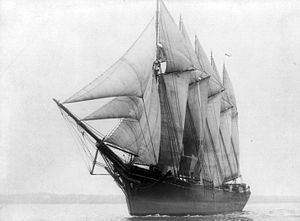I started this blog originally with the idea that it would focus primarily on Wikipedia and issues surrounding it. I've found that harder than I expected – both in terms of motivation to do it, and in terms of finding what I wanted to say here incompatible with being a sitting member of the Arbitration Committee.
Come this January, I will no longer be a sitting member of Arbcom; I do not intend to run in this fall's elections. At that time I will feel much more free to discuss issues of Wikipedia without everything I write looking to some as if they are pronouncements of policy rather than personal ideas.
In the meantime, and thereafter, this blog will also contain much more of my personal writing, journalling and recollections. I am feeling the urge to write more, and more personally, rather than explicitly for an audience. If you read this blog (someone might!), you'll see a more eclectic grab-bag of stuff than hitherto.
I also intend, from now on, to publish my commentary on things I read online here, rather than commenting on blogs and the like. That was, after all, the original purpose of a weblog – an annotated stream of stuff one found on the web with personal opinion and commentary.
Showing posts with label Wikipedia. Show all posts
Showing posts with label Wikipedia. Show all posts
Friday, July 18, 2008
Sunday, June 8, 2008
Changing the world via Wikipedia?
Too many people come to Wikipedia in order to change the world, to set things right, to tell The Truth about something. I think it's one of the root causes of dissatisfaction among new editors, and one of the things that sets some people on a course to consider themselves an enemy of Wikipedia.
Wikipedia's policy of Neutral Point Of View (NPOV) is an explicit statement that Wikipedia is not out to change the world's opinions. Some have even stated that it's Wikipedia's true innovation, differentiating it from other encyclopedias and reference works. Wikipedia does not attempt to judge the truth of anything; instead, Wikipedia reports accurately on what the state of current belief is.
If there is disagreement, Wikipedia gives space to all sides in proportion to the prevalence of each. (This latter is the prescription against "Undue weight", and is what differentiates Wikipedia's NPOV from journalistic even-handed neutrality. Wikipedia does not have to give equal time to members of the Flat Earth Society against scientific consensus of Earth's rough sphericity.)
Wikipedia doesn't care if you think you know the Truth or even if you can prove it—unless that proof comes in the form of solid citations to respectable sources. This, I find, bothers people who are sure they know the Truth about a subject—any subject.
Wikipedia's policy of Neutral Point Of View (NPOV) is an explicit statement that Wikipedia is not out to change the world's opinions. Some have even stated that it's Wikipedia's true innovation, differentiating it from other encyclopedias and reference works. Wikipedia does not attempt to judge the truth of anything; instead, Wikipedia reports accurately on what the state of current belief is.
If there is disagreement, Wikipedia gives space to all sides in proportion to the prevalence of each. (This latter is the prescription against "Undue weight", and is what differentiates Wikipedia's NPOV from journalistic even-handed neutrality. Wikipedia does not have to give equal time to members of the Flat Earth Society against scientific consensus of Earth's rough sphericity.)
Wikipedia doesn't care if you think you know the Truth or even if you can prove it—unless that proof comes in the form of solid citations to respectable sources. This, I find, bothers people who are sure they know the Truth about a subject—any subject.
Saturday, April 19, 2008
The Governor Ames


The Governor Ames was a five-masted schooner launched on December 1, 1888 by the Leavitt Storer shipyard of Waldoboro, Maine, United States; named after Adelbert Ames (former Governor of Mississippi), the vessel was the first five-masted schooner and was the world's largest cargo vessel in the late 19th century.
I've been improving its Wikipedia article. There are two nice pictures of the vessel available from the Library of Congress archives, which I've added to the article; I'm also grateful for the New York Times' opening of its archives, which has provided quite a few fine sources.
It's rather disturbing to the modern mind to realize just how much loss of life was involved in the coastal shipping trade back then. For example, all eleven six-masted schooners that were built were lost at sea, and so was the Governor Ames, off Cape Hatteras on the North Carolina coast in 1909, with the loss of fourteen lives and only one survivor.
It's also made me a lot more aware of the economics of shipping and what truly killed off the sailing ship. It wasn't speed; sailing ships were generally faster. The increasing cost of skilled labor was a big part of it. The schooner lasted much longer than other types of sailing vessel because it required only a small crew. Interestingly, such large and economical sailing vessels could only be built because of the steam engine; steam-powered winches were used to hoist the sails, haul the anchor chains, and operate pumps to keep their leaky hulls afloat. With steam winches, a small crew could handle a huge sailing vessel.
These huge sailing vessels were bulk carriers; most were built for the coal trade, taking huge cargoes of coal from the Southern ports to the industrial North-Eastern United States. The Governor Ames could carry 3,000 tons of coal in its giant holds. Similar vessels were built for the timber trade, and in fact the Governor Ames spent about five years hauling timber, including passing Cape Horn twice and visiting Australia and Argentina before returning to the coal trade for which it was built.
What finally killed these ships off was their greater risk of sinking compared to a steamer, their unpredictability since they were dependent on the winds, and the difficulty of building a sailing ship as large as the bigger steamers. Furthermore, good crewmembers saw the future coming and wanted steamer experience, not sail.
Wednesday, January 9, 2008
Learning things by writing for Wikipedia

I love learning new things, and always have; I find that writing for Wikipedia is a great way to do that. All the talk about experts often misses the point; articles for a general audience are often best written by a reasonably knowledgable non-expert referring to works by experts. To the expert, it's all obvious, and the true insights are often not already published. Since we want everything to be referenced on Wikipedia and hopefully readable by an intelligent individual not very knowledgable on the subject matter but willing to do a little background reading.
 So this week, I've started a few articles, one of which is [[du Bousquet locomotive]], about a rather obscure French design of articulated steam locomotive. I'd vaguely heard of them before, had seen a picture or two and thought them odd-looking, and paid them no further thought.
So this week, I've started a few articles, one of which is [[du Bousquet locomotive]], about a rather obscure French design of articulated steam locomotive. I'd vaguely heard of them before, had seen a picture or two and thought them odd-looking, and paid them no further thought.Then I got to searching Google Books for out-of-copyright stuff about steam locomotives (a favorite pastime; it's amazing how much stuff is out there now, scanned in from university libraries) and came across a photo in an old issue of Cassier's Magazine - an around the turn of the century illustrated magazine on engineering, mostly transportation and electrical engineering. Wikipedia needs an article on it, but that'll keep till later.
This piqued my interest and got me to researching. I found some stuff on the web, a little in recent books, and some more in Google Books, and started an article. Turns out that three different French railway systems had them, one system being almost undocumented on Wikipedia (the Grand Ceinture of Paris; hey, another article to research and write!) as well as two foreign railways; one in Andalusia in Spain, and another in China. Neither of which railway system appears to have a Wikipedia article.
Four new article ideas, not including the one I've just worked on; five, in fact, given that the designer, Gaston du Bousquet, also lacked an article. I knocked up a quick stub based on the French Wikipedia's article on him, and intend to expand it. He died in 1910, so I expect there'll be some obituaries out there in out-of-copyright land that I can easily find.
Researching any topic like this gives the lie to the idea some people have that with two million or so articles, surely everything is documented but 'cruft'? Unless one arrogantly thinks that if a young computer nerd doesn't know of it, it doesn't matter, of course. Obscure history and historical technology doesn't appear to be regularly a deletionist target, fortunately.
Instead, researching one topic finds half-a-dozen undocumented new topics, and each of those will find more, a whole growing tree of knowledge to nurture.
That's exactly why I do it.
Subscribe to:
Posts (Atom)
